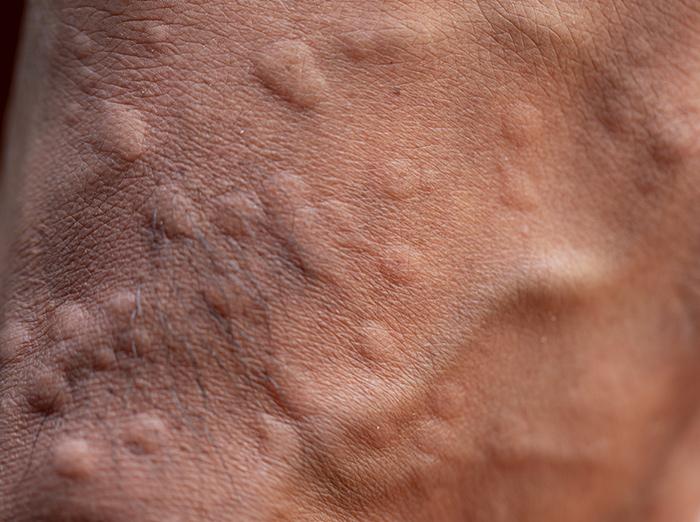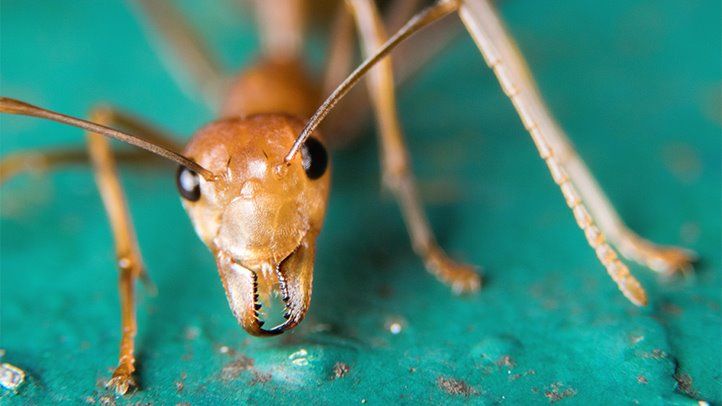When ants bite you, they release formic acid into your skin, causing pain and potential allergic reactions. Ant bites can cause immediate pain, redness, and swelling, and in some cases, may lead to allergic reactions.
It’s essential to apply a cold compress, wash the affected area, and seek medical attention for severe symptoms or allergies. Most ants do not pose a significant threat, but harvester ants and fire ants can cause unpleasant symptoms and allergic reactions.
Scratching ant bites can lead to infection, and these bites usually dry up in about four days if left alone. Ant bites are generally not a serious threat to humans, but they can cause discomfort and potential allergic reactions. Understanding the symptoms and appropriate first aid measures can help manage ant bites effectively. While most ant bites result in local pain and swelling, certain species like fire ants can lead to severe allergic reactions. Knowing how to respond to ant bites is crucial for minimizing discomfort and managing potential allergic responses. By recognizing the signs of allergic reactions and implementing prompt first aid, individuals can effectively address the consequences of ant bites. With the right knowledge and proactive measures, the impact of ant bites can be mitigated.

Credit: www.imperialpestprevent.com
Understanding Ant Bites
Understanding ant bites is important to know how to effectively treat and prevent potential complications. Ant bites can occur when ants feel threatened or when they are searching for food. While most ant bites are harmless and cause only mild discomfort, some species of ants can cause more severe reactions. In this section, we will explore the symptoms of ant bites and the different types of reactions one may experience.
Symptoms Of Ant Bites
When an ant bites you, it releases a chemical called formic acid into your skin. While most people will only experience mild symptoms such as redness, itching, and swelling at the site of the bite, some individuals may have more severe reactions. It’s important to recognize the symptoms of ant bites to determine if further medical attention is necessary. The common symptoms include:
- Redness and swelling at the site of the bite
- Itching and irritation
- A small, raised bump similar to a mosquito bite
- Pain or a burning sensation
Types Of Reactions To Ant Bites
There are different types of reactions that one may experience from ant bites, ranging from mild to severe. It’s important to understand these reactions to determine the appropriate course of action. The types of reactions include:
- Localized Reactions: Most people will experience localized reactions, which are limited to the area around the bite. This includes redness, itching, and swelling.
- Allergic Reactions: Some individuals may have an allergic reaction to ant bites. This can manifest as severe swelling, difficulty breathing, dizziness, and even anaphylaxis. Allergic reactions require immediate medical attention.
- Hypersensitivity Reactions: In rare cases, individuals may develop hypersensitivity to ant bites. This can lead to the formation of blisters, hives, and intense itching. Medical intervention may be necessary to alleviate symptoms.
It’s important to note that some species of ants, such as fire ants, are known for causing more severe reactions. Understanding the type of ant bite you have can help determine the appropriate treatment and prevent further complications.
Treatment For Ant Bites
Ant bites can cause mild discomfort or in some cases, allergic reactions. Knowing the proper treatment for ant bites is crucial for managing the symptoms and preventing further complications.
First Aid For Ant Bites
When dealing with ant bites, immediate first aid is essential to alleviate the discomfort and reduce the risk of infection. Here’s what you can do:
- Apply a cold compress: Use a cold compress to reduce swelling and relieve pain from the ant bite.
- Wash the affected area: Carefully wash the affected area with soap and water to remove any remaining ant venom and reduce the risk of infection.
Managing Allergic Reactions
For individuals who are allergic to ant bites, it is crucial to be vigilant and seek immediate medical attention if they experience symptoms of an allergic reaction. Some common symptoms of an allergic reaction to ant bites include:
- Severe swelling
- Difficulty breathing
- Dizziness or lightheadedness
If any of these symptoms occur, seek professional medical help promptly to manage the allergic reaction effectively.
Preventing Ant Bites
Understanding Formic Acid Release
Ant bites can be unpleasant, and understanding the mechanism behind it can help prevent these encounters. When an ant bites, it grabs the skin with its pinchers and releases formic acid into the skin. For some individuals, this chemical can trigger an allergic reaction, leading to discomfort and swelling. It’s essential to be aware of this process to take necessary precautions when encountering ants.
Tips For Avoiding Ant Bites
- Keep food containers sealed to prevent ants from being attracted to the area.
- Regularly clean surfaces and floors to eliminate potential ant trails.
- Seal off entry points in your home, such as cracks and crevices, to prevent ants from entering.
- Avoid leaving uncovered food and drinks in outdoor areas to reduce the chances of encountering ants.

Credit: www.millerthekiller.com
Long-term Effects Of Ant Bites
Ant bites can lead to mild symptoms such as redness and swelling. In some cases, ant venom can cause allergic reactions, leading to more severe symptoms like difficulty breathing and hives. It is crucial to seek medical attention if allergic to ant stings or experiencing unusual reactions.
One may think that ant bites are harmless, but in reality, they can have some long-term effects on your body. It’s crucial to understand these effects to ensure proper care and precautions after being bitten by an ant.Infections From Scratching
When an ant bites, it injects formic acid into your skin, which can cause itching and irritation. The natural response is to scratch the affected area, seeking relief from the discomfort. However, repeated scratching can lead to the formation of blisters, creating an entry point for bacteria. These blisters can become infected if not handled properly, prolonging the healing process and potentially causing further complications.Duration Of Ant Bite Symptoms
Ant bites are known to cause various symptoms, including pain, itching, swelling, and redness. But how long do these symptoms typically last? Well, the duration of ant bite symptoms can vary from person to person. However, generally speaking, the symptoms usually subside within a few days to a week, depending on the severity of the bite and the individual’s immune response.During this period, it is essential to resist the temptation to scratch the affected area, as it can intensify the symptoms and increase the risk of infection. Instead, you can opt for over-the-counter antihistamines or topical creams to alleviate itching and discomfort.In more severe cases where the symptoms persist or worsen after a week, it is advisable to consult a healthcare professional for further evaluation and guidance.To summarize, while ant bites may not have immediate life-threatening consequences, they can have long-term effects if not properly treated. Infections from scratching and the duration of the symptoms are two crucial aspects to consider when dealing with ant bites.It is important to avoid excessive scratching and take appropriate measures to prevent infection. By understanding these long-term effects, you can ensure the best possible care for yourself and reduce the chances of complications arising from ant bites.Remember, prevention is always better than cure. Take precautions when dealing with ants, especially if you are prone to allergic reactions or have a history of severe symptoms.Conclusion & Awareness
When an ant bites you, it releases formic acid into your skin, which can cause an allergic reaction in some people. Fire ant bites in particular can be painful and may lead to symptoms such as swelling, itching, and redness.
It is important to clean the affected area and seek medical attention if you have an allergy or severe symptoms.
According to the Cleveland Clinic, Most ants release formic acid into your skin when they bite, which can cause allergic reactions in some individuals. When it comes to ant bites, recognizing severe reactions is crucial for prompt treatment.Recognizing Severe Reactions
Symptoms of severe ant bite reactions may include widespread swelling, difficulty breathing, dizziness, and nausea. Ant bites can cause allergic reactions and should not be ignored.Public Awareness on Ant BitesPublic Awareness On Ant Bites
Public education is key in preventing severe reactions to ant bites. Proper first aid and knowledge of potential allergic reactions can save lives. Being aware of the risks associated with ant bites is essential.In conclusion, understanding the potential severity of ant bites and being proactive in seeking medical attention for severe reactions can prevent serious complications. Raise awareness about the risks of ant bites to prioritize safety and prompt treatment.:max_bytes(150000):strip_icc()/FireAntBite-9f9561b55155424b997d2bbb6cbccc7a.jpg)
Credit: www.health.com
Frequently Asked Questions For What Happens When Ant Bite You
What To Do If An Ant Bites You?
If an ant bites you, apply a cold compress to reduce swelling and pain. Clean the area with soap and water. Seek medical attention if allergic or experiencing severe symptoms.
Are Ant Bites Harmful To Humans?
Yes, ant bites can be harmful to humans as some ants release formic acid or venom, causing pain, swelling, and, in rare cases, allergic reactions requiring medical attention. It is important to wash the affected area and apply a cold compress.
How Long Should An Ant Bite Last?
An ant bite can last for about four days. It is important to avoid scratching the bite to prevent infection. Applying a cold compress and washing the affected area with soap and water can help alleviate swelling and pain. Seek medical attention if you are allergic to insect stings or experience allergy symptoms.
What Happens If You Leave An Ant Bite Alone?
Leaving an ant bite alone can cause itching and possibly infection. It’s best to wash the bite area and use a cold compress for relief.
Conclusion
When an ant bites you, it releases formic acid into your skin, which can cause a localized reaction. While most ant bites are not harmful to humans, bites from fire ants and harvester ants can result in more severe symptoms and may trigger allergic reactions.
It is important to resist the urge to scratch the bites, as this can lead to infection. Instead, wash the affected area with soap and water and apply a cold compress to reduce swelling and pain. If you are allergic or experiencing allergic symptoms, seek immediate medical attention.
Remember to avoid scratching and the bites should heal within a few days. Stay safe and take proper precautions when dealing with ant bites.

I’m MD Tanvir, and I bring years of expertise gained from working closely with pest control companies to the forefront. My journey in the industry has inspired me to launch Bug Battler, a platform aimed at equipping people with the know-how to combat pests autonomously. Through Bug Battler, I aim to empower individuals with practical insights to tackle pest infestations effectively.

